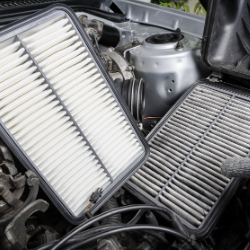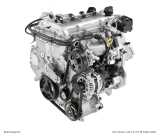How old is your air filter?
A vehicle air filter’s purpose is to trap and contain foreign particles, preventing them from reaching the engine’s combustion chamber where they can inflict significant and costly damage. That’s why an engine air filter inspection and replacement on
by Rich Ellis
AirFilter
Why is air flow important?
If you’re behind the wheel of vehicle powered by gas or diesel, that engine depends on an exact ratio of air and fuel in order for combustion to occur and the engine to run properly. When there isn’t enough air reaching the engine because of a dirty air filter, that air-fuel mixture is thrown out of balance, and can result in fouled spark plugs, increased tailpipe emissions, and reduced power.
How often should the air filter be changed?
The two best sources for determining when to change an air filter are the vehicle owner’s manual, and your trusted mechanic or service advisor. In general, air filters should be replaced approximately every 15,000 to 30,000 miles, or 12 months. If the vehicle is driven frequently on dirt roads or in dry, dusty conditions, that change interval should be shortened. Your mechanic can perform a visual inspection of the air filter to determine whether it needs to be replaced.
Potential warning signs it’s time for an air filter replacement.
Illumination of the “check engine” light could be caused by a dirty air filter as the engine struggles to perform with reduced air flow. Other warning signs include an engine that runs rough or has reduced power, or if acceleration feels sluggish.
Spring’s approach is the perfect time to determine whether your vehicle’s air filter needs to be changed. Think of it as spring cleaning for your car, as there may be leaves that were deposited in the air filter last fall or other contaminants that accumulated over the winter that need to be removed now with a new air filter.
|
|
Track Your Service Records
Get Recall Alerts
Get Updated Value Estimates on Your Car.
Go to a Review
Similar Articles
Popular Car Articles
Latest Car Reviews
Auto Tools
Local Guides
All Guides
Alabama
Alaska
Arizona
Arkansas
California
Colorado
Connecticut
DC
Delaware
Florida
Georgia
Hawaii
Idaho
Illinois
Indiana
Iowa
Kansas
Kentucky
Louisiana
Maine
Maryland
Massachusetts
Michigan
Minnesota
Mississippi
Missouri
Montana
Nebraska
Nevada
New Hampshire
New Jersey
New Mexico
New York
North Carolina
North Dakota
Ohio
Oklahoma
Oregon
Pennsylvania
Rhode Island
South Carolina
South Dakota
Tennessee
Texas
Utah
Vermont
Virginia
Washington
West Virginia
Wisconsin
Wyoming
Alabama
Alaska
Arizona
Arkansas
California
Colorado
Connecticut
DC
Delaware
Florida
Georgia
Hawaii
Idaho
Illinois
Indiana
Iowa
Kansas
Kentucky
Louisiana
Maine
Maryland
Massachusetts
Michigan
Minnesota
Mississippi
Missouri
Montana
Nebraska
Nevada
New Hampshire
New Jersey
New Mexico
New York
North Carolina
North Dakota
Ohio
Oklahoma
Oregon
Pennsylvania
Rhode Island
South Carolina
South Dakota
Tennessee
Texas
Utah
Vermont
Virginia
Washington
West Virginia
Wisconsin
Wyoming










